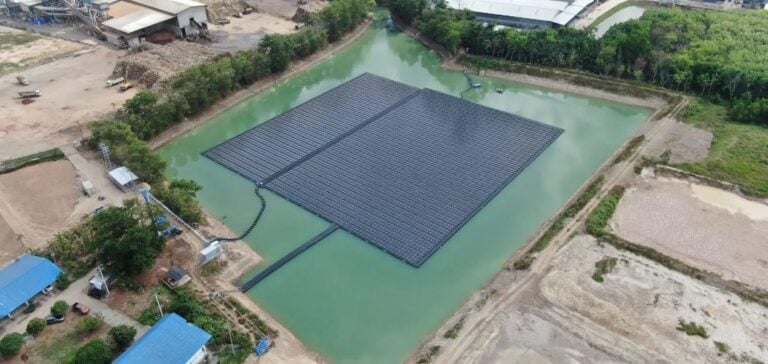TotalEnergies ENEOS, a joint venture between TotalEnergies and ENEOS, announced the completion of its first floating solar system project in Asia-Pacific, installed for the Thai wood panel manufacturer S. Kijchai Enterprise. With a capacity of 1.8 megawatt-peak (MWp), this installation strengthens the company’s decarbonization efforts while generating significant savings on energy consumption.
The project consists of more than 3,000 photovoltaic solar panels, capable of producing around 2,650 megawatt-hours (MWh) of renewable electricity annually. This production allows the company to reduce its carbon dioxide (CO2) emissions by approximately 1,125 tons per year, equivalent to planting 16,800 trees. The floating solar technology, which utilizes available water surfaces, maximizes energy efficiency while freeing up land space for other industrial uses.
A partnership model with no upfront investment
TotalEnergies ENEOS fully funded the solar infrastructure through a long-term Power Purchase Agreement (PPA). This innovative model allows S. Kijchai Enterprise to pay only for the electricity produced, with no initial investment costs. With a contract duration of 12 years, this partnership offers the company financial stability and long-term savings while helping it move closer to its environmental goals.
Harnsiri Sangwongkit, Senior Vice President of S. Kijchai Enterprise, highlighted that this initiative strengthens the company’s commitment to sustainability. By adopting innovative energy solutions such as floating solar technology, the company is reducing its carbon footprint while meeting the growing sector demands for cleaner energy.
Strengthening collaboration for a sustainable future
Alexandru Buzatu, Director of TotalEnergies ENEOS for Asia, expressed satisfaction with the completion of this project, emphasizing that this initiative marks an important step in the collaboration with S. Kijchai Enterprise. This floating solar system follows a first rooftop solar project completed four years ago, consolidating the joint efforts of the two companies toward greener energy.
This installation is also part of a broader strategy by TotalEnergies ENEOS, aiming to support Asian industries in their energy transition. The joint venture plans to develop 2 GW of decentralized solar capacity in the Asia-Pacific region within five years, thus meeting the imperative to reduce CO2 emissions and the growing demand for renewable energy in this area.
Renewable energy development in Asia
The Asian market, particularly Thailand, is witnessing a growing interest in renewable energies, driven by energy transition initiatives and decarbonization needs. With this project, TotalEnergies ENEOS strengthens its role as an energy partner to local industries, providing innovative and sustainable solutions tailored to the specific needs of each client.
Aiming for an installed capacity of 2 GW in the region over the next five years, TotalEnergies ENEOS seeks to contribute to TotalEnergies’ carbon neutrality targets by 2050. This approach also echoes ENEOS’s sustainable development strategy, which has engaged in various renewable energy projects across Asia and internationally.






















